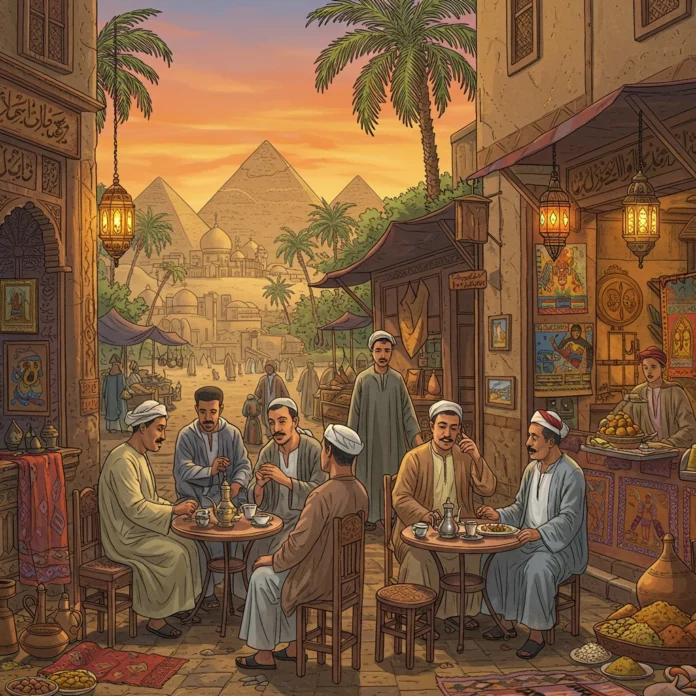Introduction to Egyptian Men and Culture
Egypt’s society is renowned for its deep-seated traditions, layered history, and the unique role that men play within its cultural fabric. Understanding the nuances of Egyptian men and culture can offer us valuable insight, whether we are planning a visit, building new relationships, or simply seeking to broaden our perspective on the world.
From bustling Cairo streets to tranquil Nile villages, the expectations, values, and customs surrounding men shape daily life in countless ways. Let us explore these dimensions with an eye for both respect and curiosity.
Who Are Egyptian Men? An Overview
Egyptian men come from diverse backgrounds, reflecting a society that balances ancient heritage with modern influences. While many uphold long-standing traditions, others are at the forefront of social change. Their lives are shaped by family, religion, social expectations, and a strong sense of community.
In urban settings, we often meet men who are cosmopolitan and career-driven, while rural areas preserve roles more closely tied to agriculture and extended kinship. This diversity makes any single definition incomplete, but it highlights the rich spectrum of Egyptian male identity.
A Brief History of Egyptian Society
The history of Egypt spans millennia, with each era leaving its imprint on the culture and expectations of men. From pharaohs and ancient dynasties to modern republics, historical events have influenced everything from family structure to societal roles.
How Has History Shaped Modern Egyptian Masculinity?
Modern Egyptian masculinity cannot be separated from the nation’s storied past. Ancient hierarchies, colonial legacies, and the rise of nationalism have all contributed to contemporary ideals of manhood.
Key Historical Influences on Gender Roles
Key influences include the patriarchal systems of ancient Egypt, religious shifts during Arab rule, and reforms under modern leaders. These forces have defined expectations for leadership, honor, and responsibility among Egyptian men.
To gain a deeper appreciation for the historical context, we recommend learning about the ancient sites around Cairo, as detailed in our guide to the Dahshur, Memphis & Saqqara private tour.
Egyptian Family Structure: Past and Present
The family remains at the heart of Egyptian society, providing both support and a framework for social expectations. Men are typically seen as providers and protectors, with their roles evolving in response to economic and social changes.
What Is the Role of Men in Egyptian Families?
Men in Egyptian families are generally expected to lead, provide, and uphold the family’s reputation. Their influence extends from daily decision-making to major life events such as marriage and career choices.
Fatherhood and Paternal Expectations
Fatherhood is considered a central aspect of male identity. Egyptian fathers are responsible for guiding their children’s moral and educational development, often with a firm but caring hand.
Male Authority and Family Decision-Making
In most households, men are viewed as the ultimate decision-makers, particularly in matters involving finances, children’s education, and marriage arrangements. This authority is woven into the fabric of both rural and urban life.
Extended Family and Male Kinship Bonds
Extended family ties are strong, with uncles, cousins, and grandfathers playing active roles. These relationships foster solidarity and a sense of duty, especially among male relatives.
Core Values and Beliefs in Egyptian Culture
Egyptian culture is anchored in values such as respect, honor, hospitality, and religious faith. These principles guide daily interactions and inform the behavior of men across different social strata.
How Does Religion Influence Egyptian Men?
Religion, particularly Islam, shapes the daily rhythms, ethical standards, and aspirations of most Egyptian men. Even among the Christian minority, faith provides a sense of identity and community cohesion.
Islamic Practices and Daily Life
For the majority Muslim population, daily prayers, fasting during Ramadan, and adherence to religious law are integral. These practices influence work schedules, family routines, and social gatherings.
Christian Minority and Cultural Identity
Egyptian Christians, primarily Copts, maintain distinctive religious traditions and celebrate unique holidays. Their presence enriches the country’s cultural mosaic and offers alternative perspectives on masculinity and community.
Respect, Honor, and Reputation
Respect and honor are central to the way Egyptian men conduct themselves. Reputation is carefully maintained, and actions that bring pride or shame to the family are taken seriously.
What Does Honor Mean for Egyptian Men?
Honor encompasses honesty, loyalty, and proper conduct. A man’s word carries significant weight, and breaches of trust can have lasting social consequences.
Hospitality and Generosity in Social Life
Hospitality is a cherished value, often expressed through elaborate meals and open invitations. Guests are treated with warmth and generosity, and men take pride in their role as hosts.
The Importance of Hospitality Traditions
Serving tea, offering food, and ensuring a comfortable atmosphere are vital. These traditions create a welcoming environment that strengthens social bonds. For those interested in experiencing Egyptian hospitality firsthand, joining a local tour can offer unique insights—consider our tips for making the most of a Private Cairo Day.
Societal Norms and Gender Roles
Social norms in Egypt have long defined the roles of men and women, but these boundaries are shifting as society modernizes.
What Are Traditional Gender Roles in Egypt?
Traditionally, men are tasked with providing for the family and representing the household in public. Women, meanwhile, focus on domestic responsibilities and child-rearing, though these distinctions are becoming less rigid.
How Are Gender Roles Changing in Modern Egypt?
Urbanization, education, and media exposure have contributed to evolving gender roles. We see more Egyptian women entering the workforce and men participating in childcare and household duties.
As experts often say:
“Culture is not static; it is a living, breathing force that reflects both tradition and transformation.”
This ongoing change is particularly visible among younger generations seeking a balanced approach to work and family life.
Marriage Customs and Expectations
Marriage remains a significant milestone for Egyptian men, shaped by family expectations, religious customs, and economic considerations.
How Do Egyptian Men Approach Dating and Marriage?
While romantic love is valued, marriages are often influenced by practical factors such as family approval, social status, and financial readiness.
Arranged vs. Love Marriages
Arranged marriages are still common, particularly outside major cities. However, love matches are increasingly accepted, especially among the urban middle class.
Dowries and Wedding Traditions
Dowries and wedding celebrations can be elaborate, underscoring the importance of family honor and social standing. Men are expected to provide for these expenses as a sign of readiness for married life.
Role of Men as Husbands
Husbands are seen as protectors and providers, responsible for the well-being of their spouse and children. These expectations can bring both pride and pressure.
Romantic Relationships and Courtship
Courtship in Egypt is guided by tradition, community expectations, and religious values, which shape how romantic relationships develop.
Is Dating Common in Egyptian Culture?
Dating exists, particularly in urban areas, but is often discreet. Many families prefer relationships to progress under their supervision, with the intention of marriage.
Public Displays of Affection: What’s Acceptable?
Public displays of affection are generally frowned upon, especially outside cosmopolitan circles. Couples tend to keep their interactions respectful in public spaces.
Communication Styles Among Egyptian Men
Egyptian men are known for their expressive communication, which includes both verbal and non-verbal cues.
How Do Egyptian Men Express Themselves?
Communication is often animated, with gestures and tone conveying as much meaning as words. Storytelling and humor play a significant role in social interactions.
Verbal and Non-Verbal Communication
Direct eye contact, emphatic hand movements, and a warm tone are common. Men may speak passionately, especially about topics of personal or national importance.
Humor and Sarcasm in Daily Interactions
Sarcasm and playful teasing are typical among friends and family, serving to build camaraderie and diffuse tension.
Work, Career, and Social Status
A man’s career and social status are closely linked in Egypt, impacting everything from marriage prospects to self-image.
What Are the Most Common Professions for Egyptian Men?
Professions range from agriculture and small business ownership in rural areas to engineering, medicine, and government roles in cities. Tourism and hospitality also provide significant employment opportunities.
With Egypt’s stunning natural attractions, some men work in tourism, such as guiding visitors on Hurghada’s Royal VIP Dolphin Trip, blending adventure with hospitality.
How Important Is Career Success in Egypt?
Career achievement is highly valued, often seen as a reflection of a man’s diligence and ability to provide for his family. Social status and respect are frequently tied to professional accomplishments.
Business Etiquette and Professional Relationships
Professional relationships are built on trust, mutual respect, and sometimes personal connections. Punctuality, appropriate dress, and polite conversation are important in business settings.
Education and Aspirations
Education is regarded as a pathway to opportunity, shaping both individual aspirations and family pride.
How Do Egyptian Men View Education?
Education is seen as essential for social mobility and personal development. Many families invest heavily in their sons’ schooling, from primary years to university.
Access to Higher Education
While access to higher education has expanded, inequalities remain based on location and resources. Nonetheless, university degrees continue to hold significant prestige.
Military Service: A Rite of Passage?
Military service is compulsory for most Egyptian men and is often viewed as a formative experience.
What Is the Role of the Military in Egyptian Male Identity?
Serving in the military is considered a rite of passage, instilling discipline and a sense of national pride. It also fosters lifelong bonds among peers.
Friendship and Social Circles
Friendship is highly valued, with social circles often extending beyond the immediate family.
How Do Egyptian Men Build Friendships?
Friendships are built through shared experiences, trust, and regular social interaction. Men often gather at cafes or homes to converse, play games, and support one another.
Male Bonding and Social Gatherings
Social gatherings can be lively, filled with laughter, storytelling, and spirited discussion. These occasions reinforce group identity and provide emotional support.
Sports and Recreational Activities
Sports are a popular way for Egyptian men to connect, compete, and unwind.
What Sports Are Popular Among Egyptian Men?
Soccer is by far the most loved sport, with games attracting passionate fans and uniting communities across the country.
Soccer Culture and National Pride
Soccer matches are vibrant affairs, complete with cheering crowds and a palpable sense of excitement. National pride surges during international tournaments.
Traditional Games and Hobbies
Backgammon, chess, and card games are also common, offering opportunities for friendly competition and strategic thinking.
Dress Code and Personal Grooming
Dress and grooming are important markers of respectability and self-respect among Egyptian men.
What Do Egyptian Men Typically Wear?
Attire varies by context. In cities, men often wear modern Western clothing, while traditional garments like the galabeya remain popular in rural areas.
Traditional vs. Modern Fashion
Traditional clothing is usually reserved for religious events and special occasions. Young men increasingly favor jeans, shirts, and branded sneakers, reflecting global fashion trends.
Grooming Habits and Personal Care
Personal grooming is taken seriously. Regular haircuts, shaving, and attention to cleanliness are considered essential for presenting oneself well.
For a rejuvenating experience that reflects the Egyptian emphasis on self-care, many visitors enjoy a Hammam & Massage Retreat in Sharm El-Sheikh.
Religion and Daily Rituals
Religious practices shape the structure of daily life for most Egyptian men, influencing work, socializing, and even meal times.
How Does Faith Shape Daily Life?
Faith guides everything from morning routines to evening gatherings. Prayers, dietary rules, and religious observances offer a sense of rhythm and meaning.
Religious Holidays and Celebrations
Major holidays such as Ramadan, Eid al-Fitr, and Coptic Christmas bring families together for feasts, prayers, and acts of charity.
To appreciate the spiritual significance of religious sites, travelers often visit landmarks across the region; for example, exploring the Blue Mosque in Istanbul offers context for understanding Egypt’s own religious monuments.
Food, Cuisine, and Dining Etiquette
Egyptian cuisine is rich and varied, with meals serving as important social occasions.
What Foods Are Central to Egyptian Culture?
Staples include koshari, ful medames, grilled meats, and fresh bread. Meals are often accompanied by salads, dips, and sweet desserts.
How Do Men Participate in Food Culture?
Men frequently gather for communal meals, especially during religious festivals or major family events. Dining together strengthens bonds and affirms social ties.
Navigating Public Spaces as a Man
Public behavior is governed by unwritten rules that reflect respect for tradition and communal harmony.
What Is Expected Behavior in Public?
Men are expected to dress modestly, behave courteously, and avoid confrontations. Loud or disruptive behavior is generally discouraged.
Interactions with Women in Public
Interactions with women are typically formal, especially in conservative areas. Politeness and respectful distance are appreciated, and public flirtation is avoided.
Views on Love, Romance, and Relationships
Love is often expressed through actions rather than words, with men showing care by providing for and protecting their loved ones.
How Do Egyptian Men Express Love?
Gifts, acts of service, and steadfast support are common ways Egyptian men demonstrate affection, both within families and romantic relationships.
Challenges in Cross-Cultural Relationships
Cross-cultural relationships can be rewarding but require sensitivity to differences in values, expectations, and communication styles.
What Should Foreigners Know About Dating Egyptian Men?
Foreigners should be mindful of the importance of family approval, religious beliefs, and social conventions. Open communication, patience, and willingness to learn go a long way in building trust.
Cultural Misunderstandings and Stereotypes
Misconceptions about Egyptian men can arise from media portrayals or limited exposure to the culture.
What Are Common Misconceptions About Egyptian Men?
Some stereotypes paint Egyptian men as overly traditional or conservative. In reality, attitudes and behaviors vary widely across regions, generations, and social classes.
How to Avoid Stereotyping
Approaching individuals with respect and openness, rather than assumptions, allows for genuine understanding. Listening and asking questions demonstrate interest and humility.
Role of Egyptian Men in Politics and Society
Men have historically played prominent roles in Egypt’s political and civic life, though women’s participation is steadily increasing.
Are Egyptian Men Politically Active?
Political engagement varies, with some men actively involved in local or national politics while others focus on family or business concerns.
Social Movements and Civic Engagement
Social movements have seen increased participation from men advocating for reforms, civil rights, and community development.
Modern Challenges Facing Egyptian Men
Economic pressures, social change, and shifting expectations present unique challenges for Egyptian men today.
How Do Economic Conditions Affect Men?
Unemployment, inflation, and competition for jobs can create stress and affect self-esteem. Many men shoulder the responsibility of supporting extended families.
Mental Health and Social Pressure
Mental health is an emerging concern, as traditional norms sometimes discourage open discussion of emotional struggles. Support networks and awareness are slowly expanding.
How Are Attitudes Toward Masculinity Evolving?
Attitudes toward masculinity are changing in response to new influences and generational shifts.
Influence of Media and Pop Culture
Media portrayals, both local and international, are challenging stereotypes and broadening definitions of what it means to be a man in Egypt.
The Impact of Globalization
Globalization brings exposure to new ideas and lifestyles, encouraging greater flexibility and acceptance of diversity within Egyptian society.
Travel Tips: Interacting with Egyptian Men
Visitors to Egypt benefit from understanding local etiquette and social expectations when interacting with men.
How Should Visitors Approach Social Etiquette?
Politeness, modest dress, and genuine interest in local customs foster positive interactions. Observing how locals behave and following their lead can help us avoid unintentional offense.
Dos and Don’ts for Foreigners
- Greet with a handshake or polite nod.
- Use formal titles and surnames in professional settings.
- Refrain from public criticism or confrontation.
- Show respect for religious practices and spaces.
Building Respectful Relationships
Taking time to build rapport, showing appreciation for hospitality, and being open to learning about different perspectives are valued. For those planning to find tours or experiences, a little cultural awareness goes a long way toward meaningful exchanges.
How to Book on Viator
Booking activities, tours, and cultural experiences in Egypt is easy with Viator. Their platform allows us to browse a wide range of options, from guided museum visits to adventure excursions, all with reviews and transparent pricing.
To plan your trip or reserve a spot on a memorable tour, simply visit Viator. The process is straightforward: select your preferred activity, check availability, and confirm your booking online.
Whether you want to explore Egypt’s ancient wonders or join a culinary adventure, Viator offers convenient options to suit every traveler’s interests.
Conclusion: Embracing Egyptian Diversity
Egyptian men and culture reflect a complex blend of history, faith, and evolving social norms. By approaching these traditions with curiosity and respect, we can form deeper connections and gain a richer understanding of the country’s vibrant society. For more guides and travel inspiration, visit Izase.
“Disclaimer: This information is accurate to the best of our knowledge; however, there may be changes or mistakes. Please verify exact details on the Viator booking page.”


